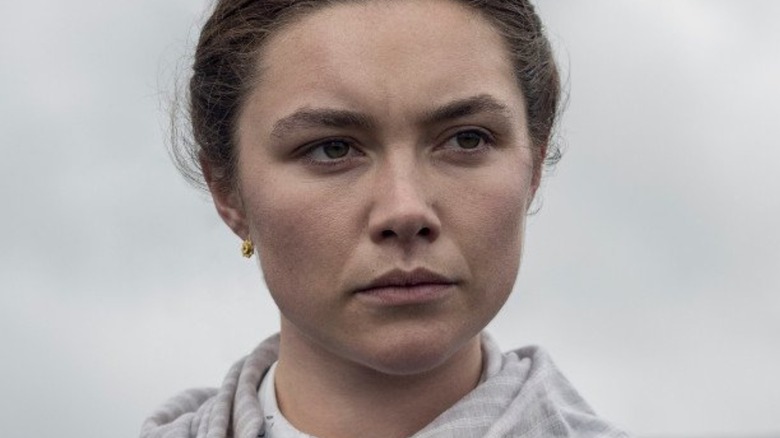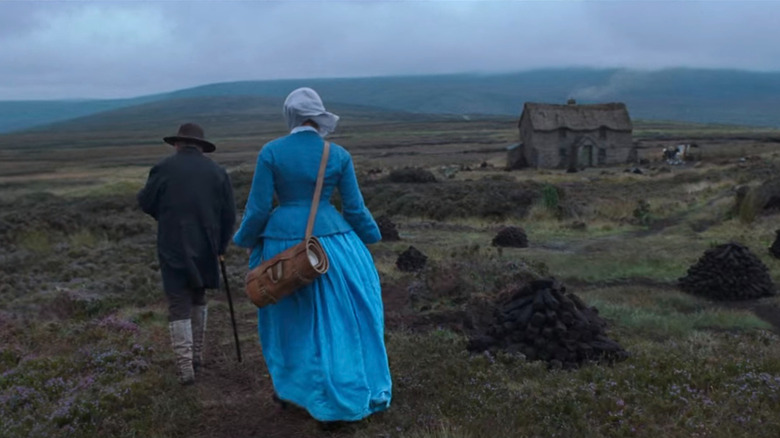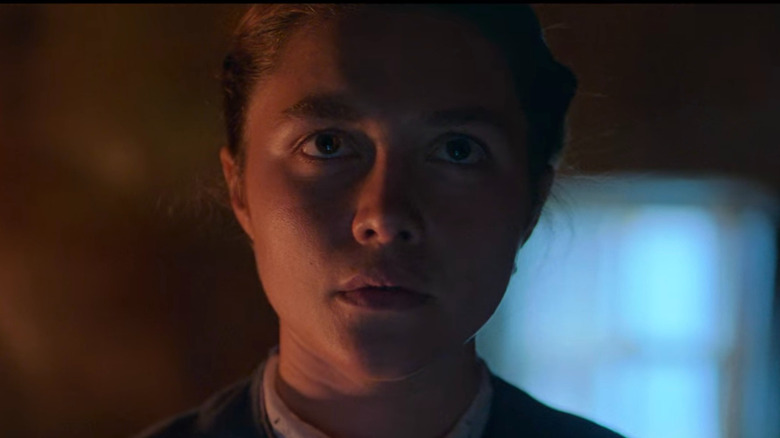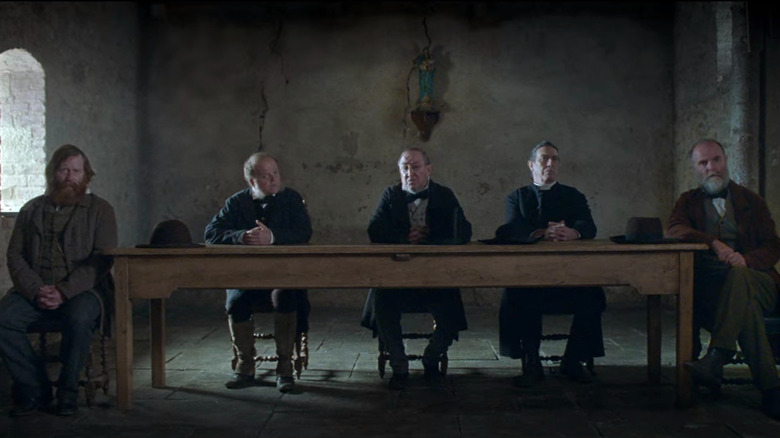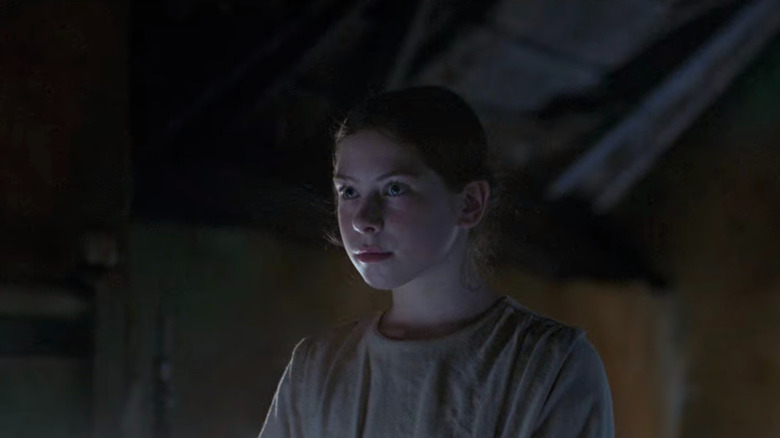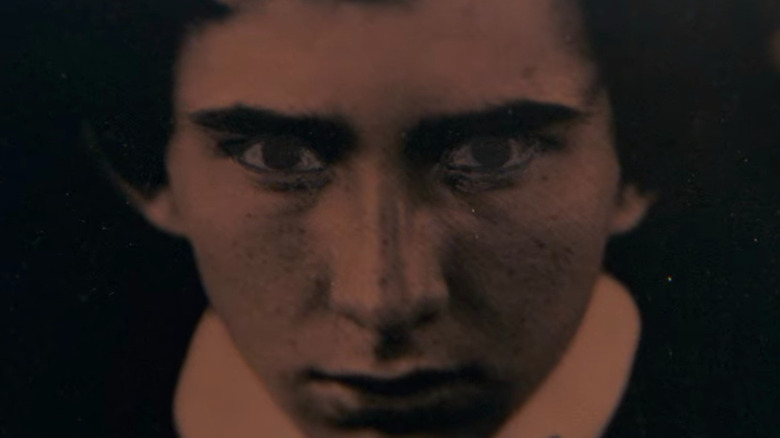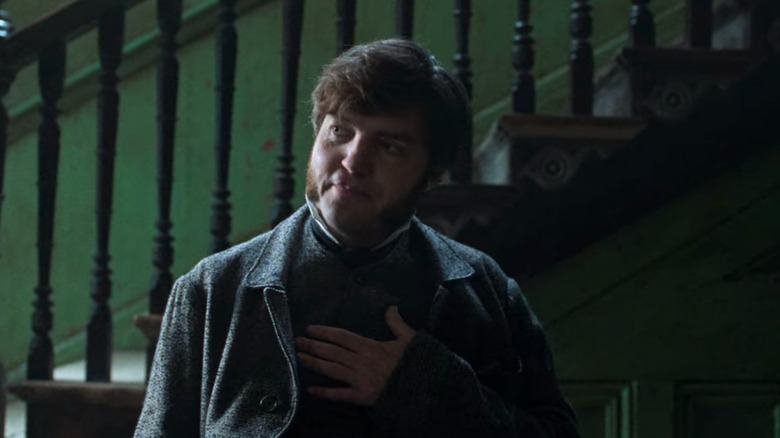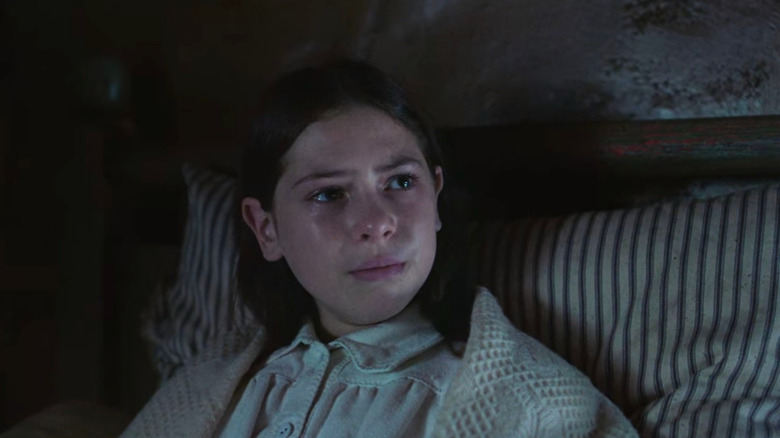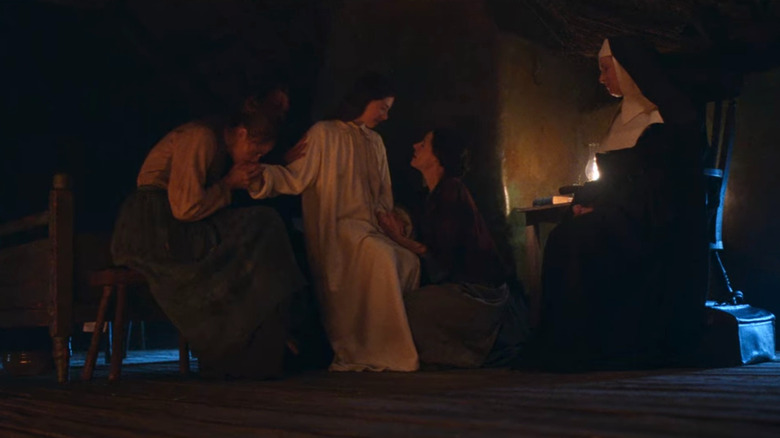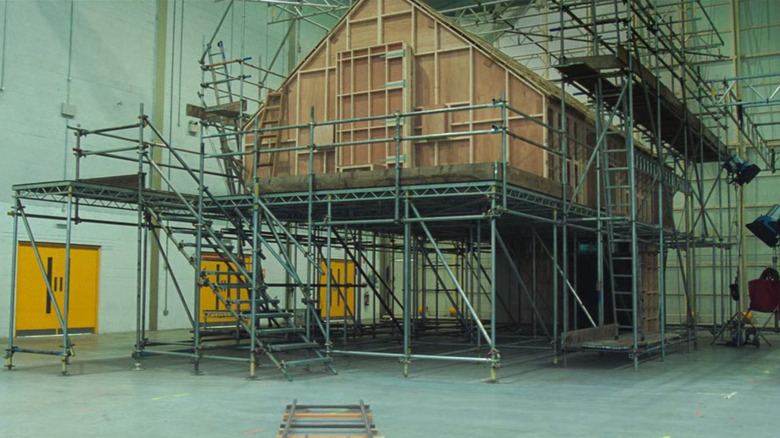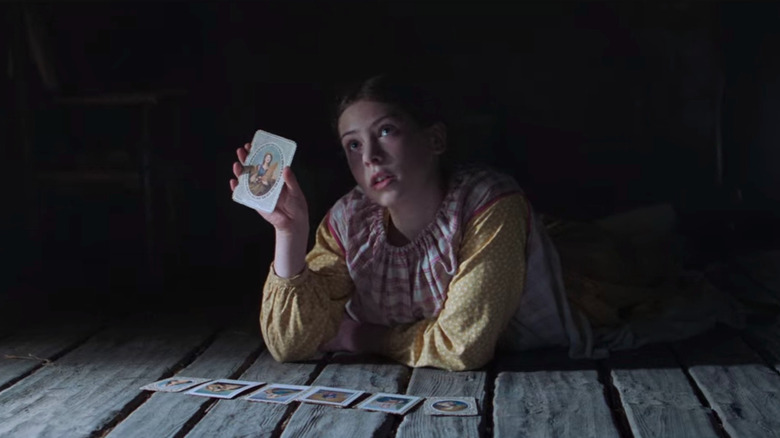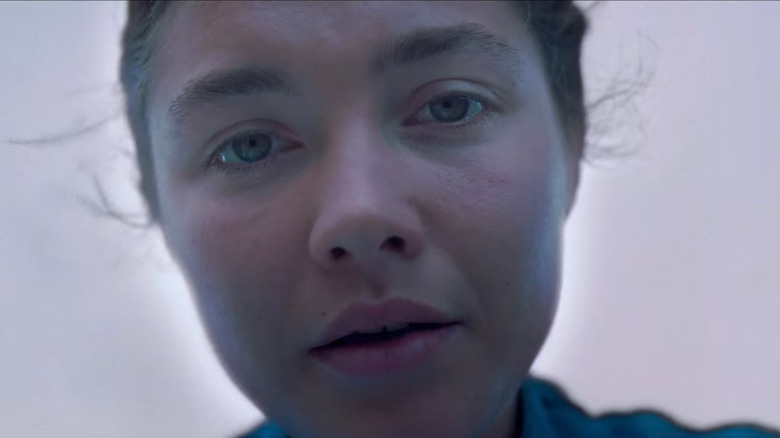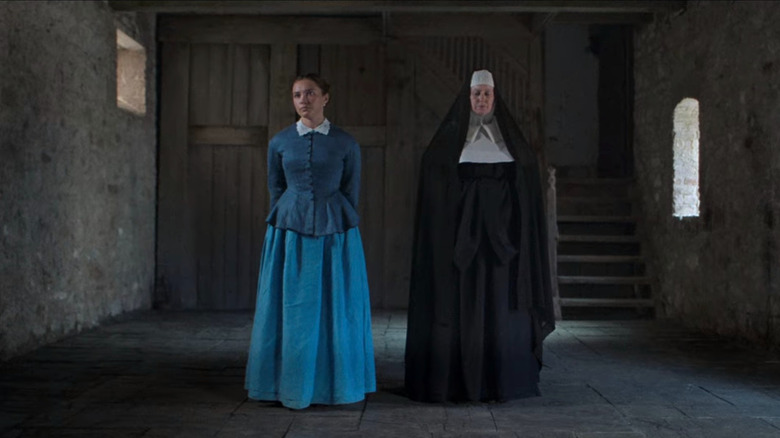The Ending Of Netflix's The Wonder Explained
Netflix's "The Wonder," based on the novel of the same name by Emma Donoghue (who also wrote the novel that inspired "Room"), tells the story of an English nurse who travels to a village in rural Ireland in the wake of the Great Famine to observe an 11-year-old girl who hasn't eaten for four months. The movie follows the nurse, Elizabeth Wright (Florence Pugh), as she and a nun attempt to discover whether the child is a living miracle or is somehow sneaking food when people aren't looking.
The movie is a beautiful and often devastating exploration of faith and how it can both be used for ill and for good. It also features incredible performances from Pugh (who is even better here than in "Don't Worry Darling") and Kíla Lord Cassidy as Anna O'Donnell, the girl who does not eat. The film's consideration of faith, abuse, and the power of stories — along with its remarkable performances and beautiful cinematography — are likely to make it an awards season favorite.
So with that in mind, let's take a look at what's going on, both narratively and thematically, in this literary adaptation that's sure to become a point of conversation.
When and where does The Wonder take place?
The first shot of "The Wonder" is jarring, a static image of a home being built on a soundstage surrounded by other filmmaking equipment. We'll discuss that opening more in a moment, but it immediately creates a slight confusion about when and where the film takes place.
It's somewhat easy to miss given that the film starts with such a shocking image for what's ostensibly a period piece, but we get a voiceover from Niamh Algar, who also plays the O'Donnell family's live-in servant Kitty, explaining exactly what we're seeing. She tells us that it's 1862, and we are beginning our story with an English nurse traveling to Ireland.
That isn't just information to help us orient ourselves, it's also vital information for the rest of the story and its themes. "The Wonder" is focused on the act of eating, so its setting in the wake of a major famine in Ireland is incredibly important. The fact that the film takes place in Ireland while focusing on an English nurse is also important, given that many of the Irish farmers blamed England for the famine. This sets Elizabeth up as not only an outsider for her nationality, but an outsider that people are skeptical of or even hostile towards.
Who is Elizabeth Wright?
Elizabeth Wright, who later tells us that she goes by "Lib" with people she is familiar and friendly with, is an English nurse who has been contracted by a committee to observe Anna O'Donnell along with a nun, Sister Michael (Josie Walker). Lib and Sister Michael are to take alternating eight-hour observation shifts for two weeks to determine whether the girl is a living miracle or somehow faking her ability to survive without food.
Lib is a woman of science who is determined to discover how the girl is being fed and making it seem as though she is not. As the movie goes on, we see why Lib is so sure that something miraculous could not be happening. Lib has lived a hard life full of darkness that makes her a strict materialist, believing that anything with a hint of grace must instead be a trick.
Lib lost her only child shortly after birth, and shortly thereafter, her husband left her. Lib says that she was essentially widowed even though her husband did not die. We see that she carries a pair of baby shoes with her as a token of the child she lost. More than this experience, though, Lib also served as a nurse during the Crimean War, where she saw many men die of violently inflicted wounds. All of these experiences have led Lib to a morphine habit that she indulges nightly.
But over the course of the movie, as she bonds with Anna and learns exactly what's going on, she becomes determined to help the girl and begins to believe in hope again herself.
Who are the members of the committee?
Anna has not eaten for four months by the time that Lib arrives in the unnamed village, and this has led a committee of community members to form and begin considering ways they can prove or disprove that Anna's fast and her surprising health are a miracle. There are five members of the committee, all of whom are men.
These five men are the village priest Father Thaddeus (Ciarán Hinds), the doctor McBrearty (Toby Jones), Baronet Sir Otway (Dermot Crowley), pub owner Seán Ryan (David Wilmot), and the owner of the land where the O'Donnell family lives, John Flynn (Brían F. O'Byrne). Each of the men has differing opinions about what is going on, and each one hopes that Lib and Sister Michael will confirm their opinion on what is causing Anna's fast and what is sustaining the girl.
Flynn seems to hope that the girl is miraculous so that he can gain some favor with the Church, and Father Thaddeus of course sees the girl as a miracle. Dr. McBrearty doesn't firmly believe the child is being snuck food, as Lib does, but instead hypothesizes that she may have found some new way to sustain her body. The committee decides to bring in outside observers who are not to intervene either by withholding or forcing food on Anna so that they can determine exactly what's going on with the girl, who has already become a minor celebrity.
Who is Anna O'Donnell?
Anna O'Donnell, played by Kíla Lord Cassidy, sets the events of "The Wonder" into motion. We learn that on her 11th birthday, she told her parents she would no longer eat, making them swear that they would never ask her to eat again. When Lib arrives and asks the girl how she survives if she does not eat, Anna says that she lives on "manna from heaven."
Anna's parents Rosaleen (Elaine Cassidy, Kíla's real life mother) and Malachy (Caolán Byrne) are deeply religious and have raised their children in the Catholic church. Anna has cards with the saints on them and knows the stories of each. She's a child who is incredibly religious and prays 33 times a day. We eventually learn that Anna's brother, who has since died, told her they could "double love" each other, as siblings and as husband and wife, to convince his then-nine-year-old sister to have sex with him. It's a harrowing revelation that characterizes everything we see Anna do in the movie.
At the end of "The Wonder," Anna has nearly starved to death and has a conversation with Lib about her own mortality and potential to be reborn as a different girl. The two decide that Anna must die, but that another young girl, named "Nan" (a nickname Lib gave Anna earlier in the film) can and will live. Lib takes her to the Holy Well near the O'Donnell house and there Anna dies and Nan is born as a nine-year-old girl who never experienced the horrors Anna lived through.
If you or anyone you know has been a victim of sexual assault, help is available. Visit the Rape, Abuse & Incest National Network website or contact RAINN's National Helpline at 1-800-656-HOPE (4673).
Who was Anna's brother?
"The Wonder" includes no flashbacks of Anna's brother Pat. The most we see of him is the family portrait hanging on the wall in the downstairs dining area, but his shadow looms large over the entirety of the film. He was the elder child of Rosaleen and Malachy who died of an illness shortly after beginning a sexual relationship with his younger sister.
Anna says that at first she thought their relationship was something good and that she loved her brother, but that when he fell ill, she came to realize that it was not good and that his illness was a divine punishment from God. Unlike the majority of deaths that occur on the peripheries of the story, Anna's older brother did not die of starvation due to the famine, but was struck with a disease. That makes it easier to believe that his death was not simply one of random tragedy (or deliverance for Anna), but a meaningful punishment for his sins.
If you or anyone you know has been a victim of sexual assault, help is available. Visit the Rape, Abuse & Incest National Network website or contact RAINN's National Helpline at 1-800-656-HOPE (4673).
Who is Will Byrne and why is he important?
Will Byrne (Tom Burke) is a journalist who is sent from London to cover the story of Anna and her remarkable fast. He initially introduces himself to Lib because they're both staying at the inn in the village, and he hopes she will grant him an audience with Anna. Like Lib, Will believes that Anna is secretly eating. But when Lib begins to think that perhaps Anna is telling the truth, Will remains skeptical and becomes a foil to Lib's belief.
Over the course of the movie, Lib learns that Will is in fact from the village, and left to go to college in England. His family died during the famine, having boarded themselves up in their house so that no one would see them as they succumbed to starvation. Soon after learning this, Lib and Will begin to sleep together, leading her to grant him an interview with Anna, during which the girl reminds Will of the Holy Well he used to visit as a child.
Will is not only an important character thematically because of his doubt and cynicism, which runs even deeper than Lib's, but because he's a key character in the film's final act. In the last part of the movie, Will helps Lib free Anna from her abuse at the hands of her family by picking the girl up from the Holy Well where Lib left her and helping her escape first to London and then to Sydney.
Why was Anna fasting?
Dr. McBrearty believes that perhaps Anna has discovered a new way of sustaining human life, hypothesizing about a form of animal photosynthesis similar to how plants create their own nutrition from water and sunlight. But Lib discovers that the answer is far simpler than that.
When Lib forbids the O'Donnells from touching Anna for the remainder of her watch and the girl quickly begins to show signs of starvation, Lib realizes that Rosaleen had been feeding Anna food from her mouth every morning and night when she kissed her daughter. When Lib says that the family can no longer touch Anna, Kitty says that "a mother's kiss is sacred." It's this piece of information and Anna's language of "manna from heaven" that allow Lib to deduce how exactly Anna has been fed during the time when her family was still allowed to touch her.
Anna's fast was not a miraculous occurrence — it was a strange form of penance motivated by a family's fierce devotion to their faith, and a young girl's desperation.
How was Anna surviving without eating?
Over the course of the movie — or rather, in one pivotal and incredibly emotional scene — we learn that Anna was fasting because she hoped that her fast would allow her to save her brother from hell. Anna tells Lib that when Rosaleen learned that Pat had been manipulating his younger sister into sex, their mother blamed Anna for Pat's illness, and this led Anna to feel responsible not only for her brother's sickness and death, but also for his soul.
Anna's belief that her brother's illness was punishment from God for his sins and that he is now burning in hell and will burn for eternity unless she does something motivated her to fast. It's not exactly clear whether Anna believes that the food that her mother passed to her was in fact "manna from heaven" but it seems that she may have believed this because she refuses to accept this once Lib discovers it.
Anna's deep faith and the faith of her family pushed the girl to take on full responsibility for her brother's death and his eternal soul in a way that led her to take drastic action that she believed would help save her incestuous brother from eternal torment.
If you or anyone you know has been a victim of sexual assault, help is available. Visit the Rape, Abuse & Incest National Network website or contact RAINN's National Helpline at 1-800-656-HOPE (4673).
What's up with the beginning and ending?
Given that "The Wonder" is a period piece that takes place mostly in 19th century rural Ireland, it's shocking to see a modern soundstage as the first image in the film. In voiceover, Algar introduces the film. She says: "This is the beginning. The beginning of a film called 'The Wonder.' The people you're about to meet, the characters, believe in their stories with complete devotion. We are nothing without stories. And so we invite you to believe in this one." During the voiceover, the camera pans across the studio before finally zooming in on Pugh in a period-accurate setting on the soundstage as Algar shifts from the more meta comments about stories to introducing the story, telling us when and where it takes place.
But it's not only this introduction that breaks the illusion of the film. At one point, as Kitty, Algar looks at the camera and her voiceover comes in again to remind us, "We are nothing without stories." And at the end of the movie, the camera once again pans away from the action taking place in the 1860s to show the surrounding studio, including Algar, standing in a modern coat and repeating the words spoken numerous times through the film: "In. Out."
This framing device helps to drive home the themes of the movie, that our realities are formed by the stories we tell ourselves. Whether that be for better, like Anna deciding she can be reborn as Nan, or worse, like the O'Donnell's extreme belief that led Anna to take responsibility for her brother's crimes and nearly starve herself to death.
Is The Wonder anti-religion?
"The Wonder" is a movie that tells a harrowing story about religious abuse and highlights the ways that fervent belief can lead parents to be cruel to their children. Ultimately, though, the movie is also affirming of faith and we cannot say that it's an anti-religious movie at all. The film's extreme darkness isn't just the result of religion — the Great Famine, the death of Lib's child, and Pat's sexual abuse of his younger sister are not motivated by religion, but they do function to make it difficult to believe in a God in such a bleak and cruel world, and perhaps even mock the idea of a caring God that would allow such suffering to exist.
The potential reading that the film is anti-religion comes from the fact that it's Anna's faith, specifically the faith that she has been taught by her parents, is what pushes her to fast. And more specifically, it's Rosaleen telling Anna that her brother's death is her fault that motivates Anna to refuse food and nearly starve herself to death. Rosaleen does not tell Anna this out of malice, but out of a desperation to make sense of her world and what is going on, a desperation to maintain the stories about God that she knows and understands.
But by the film's end, when Lib and Will have saved Anna/Nan from this household and are on their way to a new life together, we can't say that the film is anti-religious. After all, the act of saving Anna/Nan is an act of grace. And the film makes clear that it is not an anti-religion movie when Lib speaks with Sister Michael after bringing Anna to the Holy Well and setting fire to the O'Donnell's house (so that no one will suspect anything when they can't find Anna's body). The nun tells Lib that she was granted a vision of "an angel on horseback riding away with Anna," confirming that she saw the girl being taken away but believes this was an act of grace.
Is there a miracle in The Wonder?
The question of whether a miracle occurs in "The Wonder" is somewhat complicated. It's not exactly ambiguous, but there is a strong "no" answer to the question, and a strong "yes" answer, depending on how you look at it. If the question is whether Anna was miraculously surviving without food, then the answer is simple: no. Anna was surviving on food being fed to her by her mother that the girl may have genuinely believed was "manna from heaven," but there was nothing miraculous about her fast.
If the question is whether or not there was an act of literally incredible grace that could make someone believe, the answer is a firm "yes." When Anna and Lib agree that Anna must die, but that there is a possibility for Nan to be born, for the girl to be reborn as a girl who has never experienced the horrors Anna experienced, they are discussing a miracle. And when that actually happens, with an incredibly beautiful and angelic shot of Lib backlit and hovering over the girl as she awakens as Nan, we can confidently say that yes, there is a miracle in "The Wonder."
What is The Wonder about?
"The Wonder" is about a lot of things. There are issues of religion, abuse, and the ways we use stories to make sense of the world and survive its cruelties. That focus on stories, as the meta introduction indicates, is the primary theme of the film. "The Wonder" tells a story about the ways that the narratives we tell ourselves to make sense of our lives can harm us and those around us in the way that the O'Donnells' extreme faith motivates Anna to starve herself in hopes of saving her brother from hell.
But it's not only these stories of religion that the film is interested in. The only time that Kitty/Algar breaks the fourth wall during the film is after Kitty has a conversation with Lib about the facts of what is going on with Anna. In particular the two discuss whether the Communion that was the last thing Anna ate before beginning her fast was "water and wheat" or "the body and blood of Christ." Lib says, "That's just a story, Kitty," but quickly apologizes. It's Kitty's response that Lib is telling herself stories and that Lib's notebook in which she collects facts about Anna is essentially a "bible" that's more thematically important. And that importance is hit home by the fourth wall break in which Algar reminds us again, "We are nothing without stories."
And in the film's final moments, the story that Anna and Lib create together about a nine-year-old girl named Nan emphasizes once again the main theme of the film: that stories are literally necessary for our survival as human beings.
